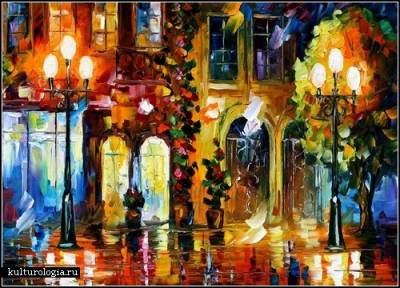|
Arts Impact on People
|
|
| Teacher | Date: Saturday, 04.02.2012, 11:04 | Message # 1 |
 Head teacher
Group: Admins
Messages: 375
Status: Offline
| Music, Literature, Painting, Sculpture, Architecture... Can we say that all arts have the same level of impact on the observer? As for the music it is said that ancient cultures used music as a mnemonic device to imprint vital stories and myths onto young minds, passing down tribal histories. Music can unlock and evoke powerful religious emotions. According to the American Music Therapy Association, music is curative and restorative for a wide variety of conditions, even as aid to help with physical rehabilitation and assisting those with disabilities.
More information about music influence here...
In Vino Veritas...
|
| |
|
|
| Asya | Date: Saturday, 04.02.2012, 14:00 | Message # 2 |
 Union committee president
Group: Moders
Messages: 298
Status: Offline
| Quote (Seagull) music is curative and restorative for a wide variety of conditions
I've also read about that. I know that being seriously injured some people can't even remember the process of dressing up or locking the door. And they can't learn the language. But, at the same time, these activities become possible for them if the algorithm is taught via songs & therefore singing. So, music can really be the way of helping people recover.
|
| |
|
|
| MissJane | Date: Saturday, 04.02.2012, 15:25 | Message # 3 |
 Union organizer
Group: Friends
Messages: 193
Status: Offline
| Paintings can be even more powerful in the use of colours that suggest, awake memories, bring associations, inspire and perplex. The aesthetic aspects of colours can be investigated in three different directions: sensitive-optical, psychic, and intellectual-symbolic. Colours influence not our eyes only: we can taste the sweet pink, can hear the loud red, can smell the fresh green. Some pictures can shock the viewer, get hold of the attention, mesmerize, evoke strange feelings and stir deep emotions.

|
| |
|
|
| Teacher | Date: Saturday, 04.02.2012, 18:36 | Message # 4 |
 Head teacher
Group: Admins
Messages: 375
Status: Offline
| Asya, music is vibration. I think everybody knows such an experiment: there were two glasses of water. The first one was influenced by some classical piece of music, and the second - by some piece of rock music. Then the water in both glasses was frozen, and the water crystals were eexamined. The crystal latitude of the water in the first glass was beautiful, as for the second "probationer" its crystal latitude was ruined completely.
MissJane, the definitions of colours are so unexpected indeed. For example, snappy red. It seems that a lot of color casts are based on fruits.
In Vino Veritas...
|
| |
|
|
| Asya | Date: Sunday, 05.02.2012, 12:13 | Message # 5 |
 Union committee president
Group: Moders
Messages: 298
Status: Offline
| Seagull, I haven't heard about such an experiment. But I have heard that the influence of music on people is really great. I've once read an article that said that different musical tones influence different parts of our body. And, of course, some statistical data and the results of experiments were provided.
I've also noticed that undergoing this or that emotion I feel a very strong desire to "produce" music. I never compose things. But playing Haydn or Mozart can really change my mood. More than anything else.
|
| |
|
|
| Teacher | Date: Sunday, 05.02.2012, 13:37 | Message # 6 |
 Head teacher
Group: Admins
Messages: 375
Status: Offline
| Asya, our emotions depend not only on our psyche, but on our heart too. Music can influence any part of our body including heart. So maybe Haydn or Mozart influence our hearts in particular.
In Vino Veritas...
|
| |
|
|
| Luck | Date: Sunday, 05.02.2012, 14:47 | Message # 7 |
|
Union organizer
Group: Friends
Messages: 172
Status: Offline
| Seagull, I would like to ask you some question concerning your example. I have also heard about such an experiment and that was really amazing for me to know that even water can somehow feel music and like a human it can like it or not - it can be proven by the changes that happened to the water in the glasses. Nowadays we all speak about art as something that can assume different forms and kinds. So in case someone says "I don't like it", he/she gets the answer "THIS is art, and YOU simply do not understand it!". So maybe water just recognised what was a real art and what was not? So maybe classical music is a real art and rock music is just music, sounds?
At the same time, there are some rock songs that I like very much and can say that this rock music is great music. Or maybe it is just a matter of my like/dislike?
|
| |
|
|
| Teacher | Date: Monday, 06.02.2012, 22:58 | Message # 8 |
 Head teacher
Group: Admins
Messages: 375
Status: Offline
| Luck, well on the one hand we can say that water is objective in case of whether-this-music-is-a-real-art analysis. But on the other hand not all emotions or thoughts that are expressed by means of music can be apparelled in the form melodiousness. As I've said the key point in the experiment with glasses of water is vibrations. They can be creative or destructive. But don't famous writers use some rude words or hard-hitting tokens in order to get some message or feeling across to their readers?
Quote (Luck) So in case someone says "I don't like it", he/she gets the answer "THIS is art, and YOU simply do not understand it!".
When we say "I like/dislike smth." it has nothing in common with our ablitity to understand things. And to use the answer above is just ignorant and makes people think of the level of "answerer's" education in the sphere of art.
In Vino Veritas...
|
| |
|
|
| Ayayulia | Date: Tuesday, 07.02.2012, 13:42 | Message # 9 |
 Union organizer
Group: Friends
Messages: 126
Status: Offline
| Quote in case someone says "I don't like it", he/she gets the answer "THIS is art, and YOU simply do not understand it!".
Luck, I completely agree with you. Now even garbage can be regarded as a work of art, you should just understand how deep the idea of the author is. For me real art is what a usual person can not create, something that needs talent. But real “connoisseurs” of art may say that I’m just a narrow-minded person))

|
| |
|
|
| Teacher | Date: Tuesday, 07.02.2012, 15:46 | Message # 10 |
 Head teacher
Group: Admins
Messages: 375
Status: Offline
| I think that to understand the difference between art and not-art we should have a set of rules and characteristics helping to define real art. But art is a process of creation itself. And it is always creative and constructive. It depends on the artist himself. Art is a stream of thought and oeuvre. And this very stream does not accept any boundaries.
In Vino Veritas...
|
| |
|
|
| Asya | Date: Friday, 10.02.2012, 12:02 | Message # 11 |
 Union committee president
Group: Moders
Messages: 298
Status: Offline
| Quote (Seagull) I think that to understand the difference between art and not-art we should have a set of rules and characteristics helping to define real art
And I don't think so. I believe that no algorithms should be created for us to say whether something is "real art". if it is real Art, it should be obvious. I mean, there should be no criteria. You should just look at it and say, "Wow! That's wonderful! And that is Art!". To my mind, Ayayulia is right claiming that Art is Quote (Ayayulia) something that needs talent
And we won't create a set of rules helping to define Talent, will we?! 
|
| |
|
|
| MissJane | Date: Monday, 13.02.2012, 19:16 | Message # 12 |
 Union organizer
Group: Friends
Messages: 193
Status: Offline
| Ayayulia, Asya, I just find my words in yours. When I see a painting, I always question myself: "Could I do the same?" No? Then that's art. Unbelievably simple but it helps to re-decorate the impostors from the impudently awarded medals. Art needs talent but can it be developed? Can one become an artist just by their tenacity and assiduity? (probably the questions are off topic but it's challenging to answer them)
So one possible kind of impact of art is the opportunity to test your abilities, to look for the inquisitive mind in your head 
|
| |
|
|
| Samsik | Date: Monday, 28.05.2012, 12:12 | Message # 13 |
|
Monitor
Group: Users
Messages: 20
Status: Offline
| As private and public agencies seek innovative ways to employ the arts to improve and strengthen communities, they have become increasingly interested in assessing the impact of their investments. In this context, arts advocates and researchers have made a variety of ambitious claims about how the arts impact communities. These claims, however, are made problematic by the many complications involved in studying the arts. Just consider the possible definitions of the phrase, “the arts impact communities.” When speaking of “the arts,” do we refer to individual participation (as audience member or direct involvement?), to the presence of arts organizations (non-profit and for-profit?) or to art/cultural districts, festivals or community arts? When speaking of “impact,” do we refer to economic, cultural or social impact; do we refer exclusively to direct community-level effects or do we also include individual- and organizational-level ones? By “communities,” do we mean regions, cities, neighborhoods, schools or ethnic groups? Of course, there are no authoritative answers to these questions, since different research questions require different definitions. And as one might expect, arts impact studies employ these heterogeneous definitions in a variety of combinations. Given this array of definitions, how would we go about measuring the impact of the arts on communities? One problem is that researchers and arts advocates rarely seem to consider such complications when making claims about the broader impact of the arts, and seldom discuss the implications of making particular theoretical and methodological choices.
|
| |
|
|
| Amaranta | Date: Wednesday, 26.09.2012, 02:13 | Message # 14 |
 Monitor
Group: Users
Messages: 40
Status: Offline
| To tell the truth, I deeply believe that every person is creative by nature. We all have this ability as a birth right. Some of us use it, others don`t. But our mind is sponteniously creative. It means that we can see unique even in common things. For example, we are hurrying somewhere but suddenly notice that everything around us is coloured in yellow, red, purple, crimson…. «It`s an autumn» - appears in our mind.
As we get older, our mind becomes less creative. But we can develop it! After all, being on a pension, we can afford to do everything what we want)))
|
| |
|
|
| Nadya | Date: Wednesday, 26.09.2012, 10:27 | Message # 15 |
 Union committee president
Group: Moders
Messages: 213
Status: Offline
| Actually, I think it's more likely for older people to stop, have a look at the past and take a delight in every moment of their life)) Here is another question- how arts can impact on older people? Do arts wield influence on them in a different way?
I'd also like to give an example)) The professor of medicine (Nagaller) managed to learn the English language when he was 80! So, as the saying goes, "Nothing is impossible for a willing heart"))))
|
| |
|
|
|












